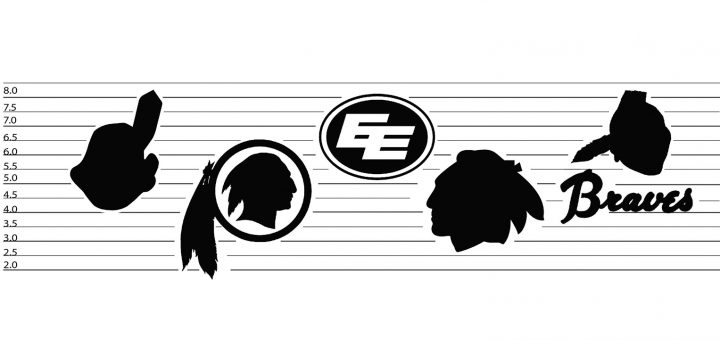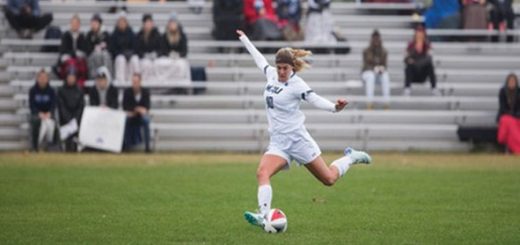Questions over use of Indigenous imagery and nicknames

Football, hockey and baseball teams are being asked to address what many call appropriative and racist team names
By Cameron Mitchell, Contributor
In the past few years, many North American sports teams have been questioned about the use of Indigenous imagery and offensive nicknames. Spanning various sports and sporting organizations across North America, these teams include the Washington Redskins, the Chicago Blackhawks and the Edmonton Eskimos.
The NFL’s Washington Redskins have seen particular media scrutiny over years of failed attempts to force the team and the league to take action on what activists say is racist iconography.
The Chicago Blackhawks, who have won more Stanley Cups over the past decade than any other NHL team, have also been questioned about their team name and logo.
Many American college level teams have changed their names in the past to remove appropriative Native American mascots and nicknames. Earlier this year MLB’s Cleveland Indians announced they would be retiring their mascot, Chief Wahoo and renaming the team. This comes after the commissioner of baseball, Rob Manfred, reportedly began to pressure the team to change its name and imagery after years of protest by activists. The name change has been met with resistance from some fans, but has been met with support by progressives.
It is uncertain when other top-level teams will see similar changes. In January, NFL Commissioner Roger Goodell said that he would not pressure the Washington Redskins to change their name. Speaking on ESPN, Goodell said that “This issue has been around for several decades if not longer… [Redskins owner] Dan Snyder has really worked with the Native American community to better understand their perspective.”
Goodell, who has previously defended the Redskins’ name, cited a 2016 poll by the Washington Post that found nine out of 10 Native Americans were not offended by the name. The Redskins’ case was also bolstered in June of last year in a key legal battle in which First Amendment freedom of speech rights guaranteed the protection of ‘disparaging’ trademarks.
Despite this, controversy still rages as activists continue to protest the use of appropriative imagery and nicknames in sports teams. North of the border, the Edmonton Eskimos have been increasingly questioned about their name. Many consider the term Eskimo a slur, or at the very least an outdated term. As critics have highlighted, most of the people to which the term has historically applied do not self-identify that way.
Norma Dunning, an Inuit writer and scholar, said in an interview with CBC the problem with the term Eskimo “has to do with how archaeologists and anthropologists from hundreds of years ago made use of that word and their writings of what we were at that time.” She goes on to say, “the renderings of the anthropologists were generally that we were a people with a low intelligence and very caveman-like. That word and that image that came forward at the time — and still comes into play today — is derogatory and unnecessary. It’s time to get rid of it and recognize Inuit people as modern day people.”
Renae Watchman, a Mount Royal University professor says the use of the term Eskimo helps contribute to racist attidudes within sporting culture.
“There is disturbing imagery of the heads of Native people at the ends of stakes from other teams,” she says. The effects do not remain within the organization alone.
Quoted in the Globe and Mail, Prime Minister Trudeau called the issue “a discussion and a reflection that the city of Edmonton certainly needs to undertake.” Alberta Premier Rachel Notley has said, “I think that they need to have the conversation. I’m not going to tell them what they should do.”
Edmonton Mayor Don Iveson has called for the team to move quickly on making a decision as the city prepares to host the 2018 Grey Cup. Dunning says the name reflects poorly on the entire city where, according to the 2016 census, about 1,115 Inuit currently live.
In February, it was reported by the CBC and other news outlets that the team had floated the idea of a name change to season ticket holders. Though this is the first time the question has been formally posed to fans, Eskimos Vice President Allan Watt insists this does not mean a name change is coming. Some fans have reacted negatively to the question.
One non-Indigenous fan interviewed by the CBC worries that the name change might erase the team’s history. “When people think Eskimos, the first thing they think of is the team… Nobody ever turns around and then thinks, ‘Oh you’re speaking about Indigenous people up North.’ So what you would essentially be doing is erasing 60, 70 years of history surrounding this team.”
CFL Commissioner Randy Ambrosie, a former Eskimo player, has echoed similar sentiments, saying that “pride, respect and honour” are what the team name means to him.
According to Watchman “studies have also shown that Indigenous youth who only see negative caricatures of themselves as sports mascots, their levels of self-efficacy decrease.”
A 2015 editorial for the Ottawa Citizen, however, says that “The practice of naming teams after [I]ndigenous groups stems from a history of fetishizing [I]ndigenous people as noble savages and of mocking the traditions and symbols of colonized peoples. The Edmonton Eskimos seem to have got their name based on the fact that Edmonton is farther north than Calgary; the idea behind the nickname is caricaturing, even if the logo is not.”
As the 2018 Grey Cup draws nearer, the Edmonton Eskimos are likely to face more questions in the press no matter how much fans dismiss the issue.
As Dunning says, “it is a big deal.”
Watchman agrees saying, “Indigenous people are not symbols, nor are we mascots.”







